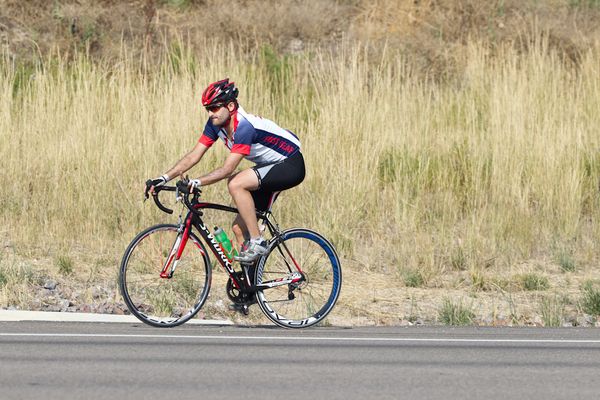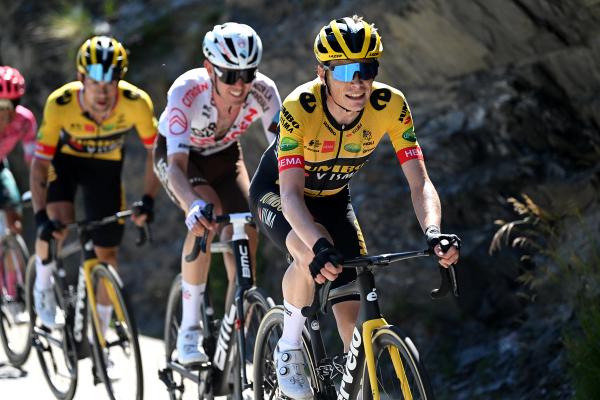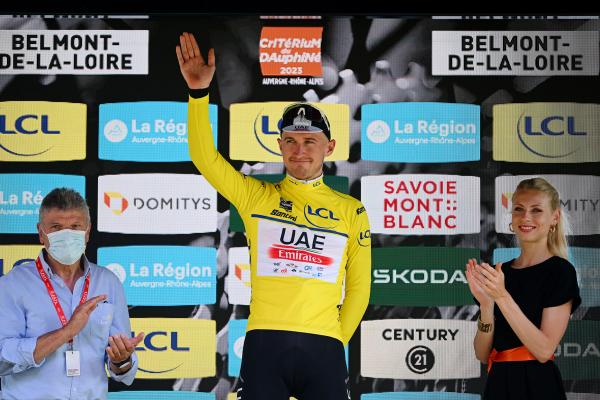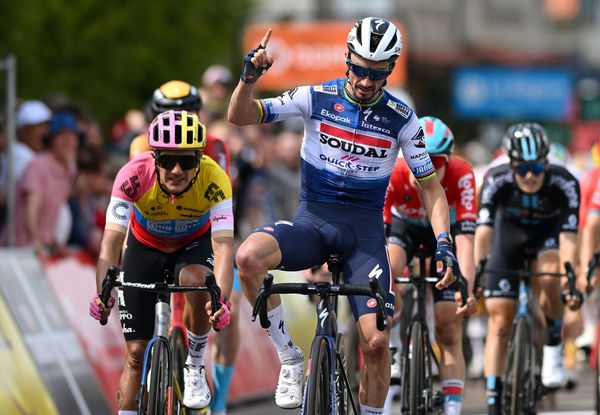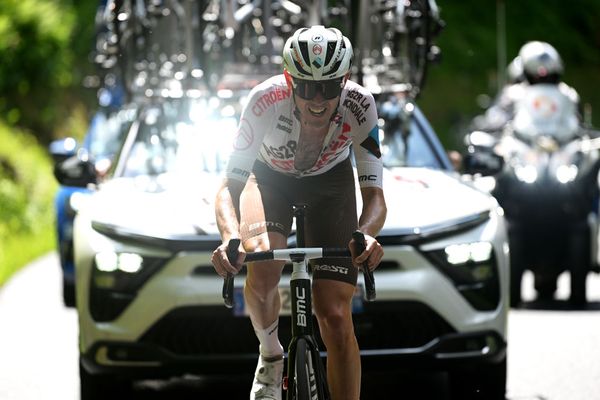Preview: Critérium du Dauphiné 2023
All riders to watch at the Tour de France warm-up race, along with a detailed race route overview
Daniel Benson
Editor in Chief
Velo Collection (TDW) /Getty Images)
Jonas Vingegaard (Jumbo-Visma) heads to the Critérium du Dauphiné as the rider to beat
With the Tour de France less than a month away the focus turns towards the all-important Critérium du Dauphiné.
The eight-day race that takes place from Sunday, June 4 to Sunday, June 11 often provides a litmus test for rider form ahead of the main event in July and this year race organisers ASO have designed a thrilling edition with three mountain stages, a 31.1km individual time trial and a batch of stages that should be finely poised for the breakaway artists and pure sprinters.
The Col de la Croix de Fer and Col de la Madeleine both feature on the Queen stage, and although defending champion Primož Roglič (Jumbo-Visma) is skipping the race after his winning antics at the Giro d’Italia, the Dauphiné startlist remains a stacked affair. Last year’s runner up and Roglič’s teammate, Jonas Vingegaard lines up as the rider to beat, while Adam Yates, (UAE Team Emirates), David Gaudu (Groupama-FDJ), and Ben O’Connor (AG2R Citroën) provide ample opposition.
Previous winners
2022: Primož Roglič
2021: Richie Porte
2020: Dani Martinez
2019: Jakob Fuglsang
2018: Geraint Thomas
The route
Stage 1: Chambon-sur-Lac → Chambon-sur-Lac (158km)
The Dauphiné rarely does the pure sprinters any favours on the opening day of racing and the 2023 route is no exception, with the opening stage destined to be contested by either a reduced bunch or a breakaway. Starting and finishing in Chambon-sur-Lac, the 158km route takes in a quintet of fourth category climbs with three ascents of the Côte du Rocher de l'Aigle forming part of a finishing circuit that will be completed several times. The 1km climb has an average gradient of 7.3%, with the final ascent coming at around 10km from the finish. A handful of hardy sprinters should survive but leadout riders and a number of fast men will either be distanced or on the limit before the final kick to the line. With just under 3,000m of climbing, it’s not too dissimilar to the opening stage that Thomas de Gendt won back in 2017.
Stage favourites: Christophe Laporte, Sam Bennett, Ethan Hayter, Matteo Trentin, Ethan Vernon
Stage 2: Brassac-les-Mines → La Chaise-Dieu (167.3km)
Stage 2 follows a similar format to the first day with a sprinkling of climbs littered throughout the 167.3km route between Brassac-les-Mines and La Chaise-Dieu. The Col de la Toutée (2.2 km at 6%) and Col des Fourches (2.7 km at 6.5%) sit back-to-back inside the opening 55km before another finishing circuit is tackled with the Côte des Guêtes (1km at 8%) climbed twice. The final ascent comes inside the final 10km, and while it could provide the perfect launchpad for a late attack, the sprinters should be able to maintain control for a slightly uphill dash to the line.
Stage favourites: Dylan Groenewegen, Sam Bennett, Ethan Hayter, Milan Menten, Christope Laporte, Greg Van Avermaet
Stage 3: Monistrol-sur-Loire → Le Coteau (194.1km)
The sprinters should be in complete control on a stage 3 jaunt between Monistrol-sur-Loire and Le Coteau with just two categorised climbs bookending proceedings. After rolling out from the start the peloton heads through the historic setting of Retournac before climbing the second category Côte de Bellevue-la-Montagne. Heading out of the Massif Central will ensure flatter surroundings with the Côte de Neulise providing the final uphill test before an anticipated bunch sprint.
Stage favourites: Sam Bennett, Dylan Groenewegen, Ethan Hayter, Milan Menten, Christope Laporte, Greg Van Avermaet, Ethan Vernon
Stage 4: Cours → Belmont-de-la-Loire (31.1km)
After three days of breakaways and sprints the GC battle starts in earnest on stage 4 with an undulating 31.1km individual time trial between Cours and Belmont-de-la-Loire. Pre-race favourite Jonas Vingegaard will look to put substantial time into his climbing rivals, although a rider such as Ethan Hayter, who was third in a similar TT last year, could pull off a surprise. Matteo Jorgenson and Ben O’Connor will be other GC candidates aiming to establish buffers over the likes of Egan Bernal and Richard Carapaz, while the gaps between the overall contenders could easily become insurmountable if any of the climbers suffer particularly bad days.
Stage favourites: Ethan Hayter, Jonas Vingegaard, Rémi Cavagna, Lawson Craddock, Bob Jungels, Attila Valter
Stage 5: Cormoranche-sur-Saône → Salins-les-Bains (191.1km)
Acting as a segue between the flatter stages and the mountains, stage 5 in the Jura département throws up a deceptively difficult day in the saddle with a 191.1km test between Cormoranche-sur-Saône and Salins-les-Bains. The first half of the stage is relatively flat as the race winds towards the Côte de Château-Chalon, a 4.4km third category climb with an average pitch of 4.5%. Two more categorised climbs are crammed into the final 40km of racing with the Côte d’Ivory and the second category Côte de Thésy. The latter is the first second category ascent of the race, and although it’s relatively short at 3.5km, the average gradient of 8.8% provides a terrain on which the race could seriously splinter. A demanding descent to the finish follows the final climb, and while the true GC riders should finish together there’s every chance that aggressive attacks could be made either side of the last ascent.
Stage favourites: Jonas Vingegaard, Mikel Landa, David Gaudu, Adam Yates, Enric Mas, Giulio Ciccone, Esteban Chaves, Omar Fraile
Stage 6: Nantua → Crest-Voland (170.2km)
Stage 6 represents the most difficult stage of the race so far with four climbs on the menu during a 170.2km march into the Alps between Nantua and Crest-Voland for the first summit finish of the race. The second category Côte de Droisy comes inside the first 50km of racing but the final 20km is a brutal mix between arduous climbing and breakneck descending. The real action starts on the second category Col des Aravis (7.8km at 5.7%) before the race hits the Côte de Notre-Dame-de-Bellecombe (3.2km at 6.1%) soon after. There’s little respite with a final third category ascent of Côte de Crest-Voland (2.3km at 6.6%) coming right after. The final climb is perfectly suited to major attacks, and although the time gaps should be marginal, it’s the perfect opportunity for the pure climbers to claw back some of the time they shipped in the time trial.
Stage favourites: Jonas Vingegaard, Mikel Landa, David Gaudu, Adam Yates, Enric Mas, Giulio Ciccone, Esteban Chaves, Daniel Martínez, Egan Bernal, Ben O’Connor, Jai Hindley
Stage 7: Porte-de-Savoie → Col de la Croix de Fer (147.9km)
The Queen stage of the Dauphiné awaits on stage 7 with a vicious finish atop the Col de la Croix de Fer. The stage might only be 147.9km in length but with over 4,000m of climbing, the overall race is likely to be decided on the slopes of the legendary climb. The Col de la Croix de Fer has been used no fewer than 21 times in the Tour de France, usually on the road towards Alpe d’Huez, but it’s given top-billing at the Dauphiné with the riders tackling the Col de la Madeleine (25.1km at 6.2%) and then the Col du Mollard (18.5km at 5.8%) before making the final ascent. Giulio Ciccone was first over the Col de la Croix de Fer when the Tour raced the climb in 2022, and it’s highly likely that the pure climbers will shine this time around, too.
Stage favourites: Jonas Vingegaard, Mikel Landa, David Gaudu, Adam Yates, Enric Mas, Giulio Ciccone, Daniel Martinez, Jai Hindley
Stage 8: Le Pont-de-Claix → La Bastille – Grenoble Alpes Métropole (153km)
The final stage of the Dauphiné offers no interruption from the climbing onslaught with six categorised climbs lodged between the start in Le Pont-de-Claix and the finish at La Bastille - Grenoble Alpes Métropole. Two second category climbs come inside the first 45km before the race offers some relief in the valley ahead of the final set of four climbs that pepper the last 50km of the stage. The HC climb of the Col du Granier opens the final chapter of hostilities with an 8.6% average gradient for 9.6km. A short descent follows before the race rises to the top of the second category Col du Cucheron (7.7km at 6.2%) and then the first category Col de Porte (7.4km at 6.8%). A long descent follows before the final 1.8km climb to the finish. Although short in terms of distance, the last climb averages 14.2%. The race could be won or lost at the death.
Stage favourites: Jonas Vingegaard, Mikel Landa, David Gaudu, Adam Yates, Enric Mas, Richard Carapaz
The contenders
Following a comprehensive team performance last year that included first and second overall, two stage wins, the points jersey and the teams’ classification, Jumbo-Visma return to the Dauphiné as the team to beat.
Defending champion Primož Roglič will not be making the trip to France after a short but well-deserved rest following his Giro d’Italia triumph, but last year’s runner-up and defending Tour de France champion Jonas Vingegaard will be present. Wout van Aert remains on the sidelines alongside Roglič, but the Dutch team still look imperious with Christope Laporte, Dylan van Baarle, Steven Kruijswijk among the ranks.
For Vingegaard, the Dauphiné represents his final stage race outing before the Tour de France. No rider since Geraint Thomas in 2018 has won the Dauphiné and then replicated overall victory in July but Vingegaard will be aiming for a commanding performance at the Dauphiné before the main event next month. Other than a resounding defeat at the hands of Tadej Pogačar in Paris-Nice earlier this Spring, Vingegaard has been all but untouchable, winning both O Gran Camiño and the Tour of the Basque Country in unconstrained fashion. Although Pogačar will miss the Dauphiné, the French race represents an important marker for Vingegaard.
Opposition towards the Dane comes in a variety of forms with a batch of potential Tour de France rivals lining up for stage 1 in Chambon-sur-Lac.
Ben O’Connor, who was third in the Dauphiné last year, returns with a strong-looking AG2R Citroën team at his disposal. The Australian hasn’t raced since the Ardennes Classics, and is yet to take a win this year, but with a route that offers plenty of friendly terrain the 27-year-old could be Vingegaard’s closest adversary.
Ineos Grenadiers arrive with a team seeking leadership answers ahead of the Tour. Carlos Rodríguez and Daniel Martínez have both been hit by illness and injury this year, while Egan Bernal has only shown early signs of promise as he continues his long rehabilitation. All three riders have been confirmed for the Dauphiné, although with Rodríguez and Martínez both linked with moves to new teams in 2024, the dynamic within the camp could be one of the most fascinating storylines of the summer.
Bora-Hansgrohe will expect last year’s Giro winner Jai Hindley to put in a morale-boosting performance this close to the Tour de France. Like a number of his GC rivals, the Australian hasn’t raced since the spring but his form appeared to be moving in the right direction earlier this year. Like the Tour, Hindley has never raced the Dauphiné, but the trio of mountain stages at the end of the race will provide the perfect terrain on which the 27-year-old could shine. French hopes are likely to rest on the shoulders of David Gaudu (Groupama-FDJ) and Julian Alaphilippe (Soudal Quick-Step).
The former has been growing in confidence and form over the last 18 months, and demonstrated his status as France’s leading male stage race rider with second overall in Paris-Nice. After a disappointing Ardennes campaign the 26-year-old will be aiming to bring his season back on track. The same could be said for Alaphilippe who has endured a difficult start to the season due to injury and illness.
The Frenchman has only broken into the Dauphiné top 10 on one occasion during his illustrious career but after such a stop-start year the two-time world champion will be expected to leave his mark by at least claiming a stage win.Elsewhere, Adam Yates is expected to set the tone for UAE Team Emirates.
With Pogačar back on the bike and training ahead of his much-anticipated Tour assault the British climber will have another chance to shine after winning the Tour de Romandie in April. Yates, who will fall in line behind Pogačar at the Tour, has the capabilities to break the race up in the mountains, while his time trials skills have improved in recent years.
Giulio Ciccone will lead Trek’s challenge, with the Italian aiming to make up for missing the Giro d’Italia due to COVID. The team will also have Juan Pedro López in their ranks they target stage wins. Richard Carapaz arrives fresh off his recent victory at the Mercan'Tour Classic Alpes-Maritimes, while Movistar’s stock will be built around Enric Mas and one of the revelations of the spring, Matteo Jorgenson.
Finally, Mikel Landa represents Bahrain-Victorious with Wout Poels also slated for a ride. The Spaniard has cracked the top 10 in every stage race he’s started in 2023, with second overall in the Basque Country his obvious highlight. Outsiders to watch include Louis Meintjes (Intermarché-Circus-Wanty), Tobias Halland Johannessen (Uno-X), Marc Soler (UAE Team Emirates) and Oscar Onley (Team DSM).
GCN’s Preview Pick
While the team’s collective prowess might not be as heavy duty as it was 12 months ago, with the likes of Primož Roglič and Wout van Aert missing from the start list, the overall versatility of Jonas Vingegaard makes him the standout candidate for the overall win at the Dauphiné. Apart from the beating he took at Paris-Nice, the Dane has looked commanding in 2023, and he will hope to create a healthy buffer in the mid-race time trial before turning the screw in the final set of mountain stages. David Gaudu and Adam Yates will look to push the Jumbo-Visma leader to his limits, and while the Tour remains several weeks away, there’s no doubting Vingegaard’s ability to hold form for substantial periods of time.
We’ll be showing live and on-demand coverage of all eight stages of this year’s Criterium du Dauphine. Head over to GCN+ now to check the start times of each broadcast so that you don’t miss out on a moment of the action! As always, territory restrictions will apply.






